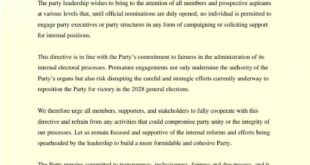The former Vice Chairman for Environment, Science, Innovation and Technology Committee and former Health Committee Member, Dr. Adomako Kissi has written to the new Chief Executive Officer of the Environmental Protection Agency (EPA), emphasizing the urgent need for safe drinking water in Ghana.
According to him, the presence of PFAS in drinking water poses a significant threat to public health and safety.
He added that the EPA must exercise primary enforcement authority over drinking water in Ghana, especially in mining districts. Safe drinking water should be affordable and accessible to all Ghanaians.
The new EPA CEO should make safe drinking water a top priority.
Furthermore, the former Member of Parliament for Anyaa Sowutuom Constituency stated that the EPA should work closely with the Ghana Water Company to ensure that water systems are properly regulated.
Additionally, he said that the EPA must take concrete steps to address the issue of galamsey and its impact on water quality.
Dr. Adomako Kissi’s letter highlights the need for a comprehensive approach to addressing the challenges facing Ghana’s water sector.
The EPA has a critical role to play in ensuring that Ghanaians have access to safe and clean drinking water.
Read Dr. Kissi’s full statement below.
SAFE DRINKING WATER AND NEW EPA BOSS
I write to the new EPA CEO and its rule establishing nationwide drinking water standards for certain and polyfluoroalkyl substances (“PFAS”). I have powerful interests in protecting residents from the harms of PFAS exposure through drinking water.
The presence of PFAS in drinking water is an established threat to public health and safety. A growing body of research shows that most, if not all, PFAS are highly toxic to humans and animals, with even minimal exposures over time associated with deleterious effects to human health.
They also resist degradation in the environment and are accordingly known as “forever chemicals.” These toxins were used for decades in myriad industrial and military settings, along with airports and fire departments. As a result, dangerous and highly mobile PFAS have contaminated numerous drinking water sources throughout the State and the bodies of our residents—where they accumulate and persist.
We must regulate PFAS in drinking water, EPA’s rule broadly complements and reinforces the various approaches taken by water factories. EPA must exercise primary enforcement authority over drinking water in our various communities, especially mining districts and thus have an interest in the law that they enforce.
Please look carefully at the operation of water systems by Ghana Water Corporation and many water producing companies in Ghana. Please pay particular attention to petitions by homeowners or residents across the country with regards to portable, affordable safe drinking water.
Drinking water comes from public water systems and private wells, which are fed by surface waters and underground reservoirs that are vulnerable to various contaminants, including PFAS. PFAS are a class of synthetic organic chemicals that have been used in numerous consumer and industrial products. PFAS are characterized in part by their strong carbon-fluoride bonds, which allow many PFAS to persist in the environment for years, decades, or longer.
Research over the past two decades clearly demonstrates PFAS toxicity, and that even miniscule exposures over time are associated with a range of adverse human health effects, including various cancers, liver disease and damage, developmental issues such as low birth weight, hormonal changes, weakened immune system, diabetes, and fertility issues.
Furthermore, oral exposure to certain PFAS is associated with several harmful health effects, including impacts on the liver, thyroid, immune system, pregnancy and fetal development, and cancer. While some types of PFAS (such as PFOA and PFOS) have been phased out of production domestically, they remain in circulation via existing products and newly imported products.
A determination to regulate requires a notice-and-comment rulemaking process and considers public health-focused criteria geared toward seizing “meaningful opportunity for health risk reduction” through regulation. The determination to regulate does not consider costs, but rather, the “best available public health information” and EPA’s database of occurrences. The Standards—which are the enforceable drinking water standards— must be set as close to the Goals “as is feasible.” While cost considerations factor into the feasibility analysis, the Act does not mandate that a Standard’s benefits outweigh its costs.
In setting those standards, EPA is required to use the “best available, peer-reviewed science” and data collected using the “best available methods.” In California, drinking water regulators have taken concrete steps to quantify PFAS contamination in the state, starting in 2019 with drinking water general monitoring orders, as well as setting nonregulatory notification and response levels for certain PFAS starting in 2020. endocrine, liver, and kidney toxicity.”). The Science Advisory Board supported that conclusion by agreeing with EPA’s evaluation of contaminants based upon similar health outcomes and noted that “many PFAS, including the four used in the examples in the draft EPA mixtures document and others, elicit effects on multiple biological pathways that have common adverse outcomes in several biological systems.”
Having concluded that the Index PFAS have dose-additive effects when in combination, EPA therefore cannot promulgate a Goal to avoid adverse human health effects and allow a margin of safety without the hazard index because promulgating individual Goals for the Index PFAS alone would be insufficient to meet the requirements of the Act. EPA had to use the hazard index to address the relative toxicity and common health risks of these PFAS in order to comply with the plain language and proactive purposes of the Act.
Furthermore, EPA cannot set appropriate Goals if it may only consider contaminants in isolation and must ignore threats to public health arising from mixtures of contaminants with dose-additive effects. That deleterious outcome would be inconsistent with the requirements of the Act.
EPA regulates sums of radionuclides under the Act, requiring water systems to add together the measured values of individual contaminants. yielded a greater amount of public input and data to consider before issuing “final determinations” than if it followed a sequential process.
Against the backdrop of galamsey menace is our water bodies for which reason I always think mining companies ought to be billed for support of water systems in the country.
I wish you the best in your new role and to encourage you and Ghana Water Company to give Ghana safe, portable drinking water at an affordable rate. We have focused so much on our energy sector, but safe drinking water is very connected to our public health and wellness as a nation. I have raised this issue because it has become very important considering the many media stories associated with our water bodies and district machines that clean and purify water for our homes. We are counting on you to make this a top most priority as you start your new position as CEO of EPA.
Thanks,
Dr. Adomako Kissi, Former Vice Chairman for Environment, Science, Innovation and Technology Committee and Former Health Committee Member.
THANK YOU for constantly reading stories on MyGhanaMedia.com, a news publishing website from Ghana. Kindly like, follow, comment, and SHARE stories on all social media platforms for more entertaining updates!
Follow us on Twitter: https://twitter.com/
Source: MyGhanaMedia.com
There are four types of content published on MyGhanaMedia.com daily: curated content; syndicated content; user-generated content; and original content.
 MYGHANAMEDIA.COM Best Source Of Latest News
MYGHANAMEDIA.COM Best Source Of Latest News





